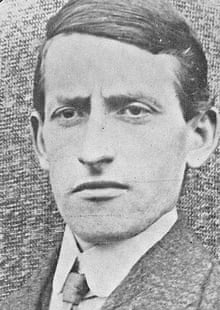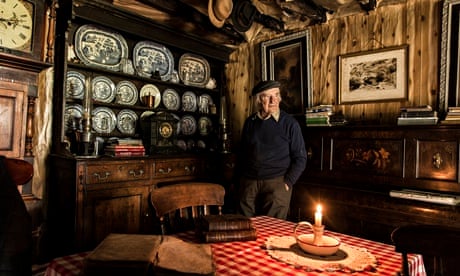In the parlour sit the chairs, six of them in all, from the simple four-square seat won in Bala in 1907 to the "black chair" of the 1917 National Eisteddfod. This throne of darkened oak has grown brittle as glass, but its ornate carvings are still clear: a Celtic cross, a fish, a ribbon, a sundial, a Welsh dragon, a serpent.
Gerald Williams, their 85-year-old custodian, stands in the afternoon quiet, surveying them all. "I used to play in them as a child," he says. "They were just part of the furniture to me. Their significance came over time."
These are the bardic chairs of six Eisteddfodau, won by Williams's uncle, the great Welsh poet Hedd Wyn – Bala, Pwllheli, Pontardawe, and Lanuwchllyn twice, as well as the national prize, an achievement rendered all the more remarkable by the humble nature of his upbringing and the brevity of his life.
Hedd Wyn (Welsh for Blessed Peace) was born Ellis Humphrey Evans here at Yr Ysgwrn, the family farm in Trawsfynydd, in 1887. He had just six years of formal schooling before joining his father on the farm at 14, working largely as a shepherd. In 1916 he was conscripted to join the Royal Welch Fusiliers, becoming one of 280,000 Welshmen who fought in the first world war, and was sent to the front in June 1917.

That year the National Eisteddfod was held in Birkenhead, and at the chairing of the bard ceremony the winning poem was named as Yr Arwr (The Hero), written under the nom-de-plume Fleur-de-Lis. But when the pseudonym of the winning poet was announced, no one stepped forward to claim the prize. It was discovered that Fleur-de-Lis was Hedd Wyn, who had been killed six weeks earlier, at Passchendaele. The chair was draped with a black cloth, and the Archdruid spoke of "the festival in tears and the poet in his grave".
This August, Hedd Wyn will be among those soldiers remembered at an event named Honour, at the Quays in Salford. Using MediaCity's buildings as giant projection screens, it will combine art, dance and a "superchoir" made up of regional choirs and volunteers, singing a commissioned piece drawing on lines by Hedd Wyn. Its creative director, Craig Morrison, began the project travelling around Britain visiting war memorials, struck by the fact that "even in the smallest villages you find memorials with a great list of names". This led him to consider the idea of war in a rural context and, eventually, to Hedd Wyn's poetry.
He was particularly moved by the shift between two poems – the romantic tribute My Love, which talks of walking "hand in hand/ To the wind's laughter through boughs of the land" and the blunter War, written shortly before his death: "The harps to which we sang are hung,/ On willow boughs, and their refrain is/ Drowned by the anguish of the young/ Whose blood is mingled with the rain."
In their differing tone and subject matter, Morrison saw an echo of the change that must have occurred in many young soldiers. "So many men went off to war who were in love, thinking they would come home to their girlfriends and wives and have a story to tell them," he says. "But in fact a generation didn't come home."
The war memorial in Hedd Wyn's village marks the deaths of 33 soldiers – 30 from the local community and three from the nearby army training camp. "Out of a population of 800," says his nephew. "A whole generation wiped out. For what? I don't know."
Williams has lived here on the farm all his life, the keeper of the Hedd Wyn flame, opening the house to visitors each day. He talks of the art of cutting peat and rolling oats, of rush candles, the family Bible, sorting the cows in the barn, and the giant oatcakes his grandmother would make on the griddle. He never met Hedd Wyn, of course. "He was killed in 1917, and I wasn't a twinkle in my dad's eye then, was I?" he says.
Hedd Wyn, born in the days of big families, was the oldest of 11 children, though Williams explains that not all of them were crammed around this small kitchen table at one time. "When the eldest child came to the age of 13 or 14, he had to go to work out on the farm," he says. "And by that time the two youngest children hadn't been born. So there were only about five children here at any one time."
The house, built in 1830, carries the breath of another age. The windows look out over slate walls and foxgloves and down into the valley, and its low ceilings and the cool, dark rooms that must once have known such activity now sit quiet and still. "This is exactly the same as it was in Hedd Wyn's time," Williams says. "Though the wallpaper has changed, yes."
He gives me a guided tour of the kitchen: the family portraits, the grandfather clock with the broken cord, the place where the scrubbed sycamore table once stood, the big Welsh dresser with its willow-pattern plates set out along the shelves. "The last one's been used the most," Williams says, pointing to a platter on the top row, a more burnished shade than the others. "When they killed two pigs at the beginning of winter and put it in the oven to make brawn. And then they used to put the geese on one of them. It has small, small cracks in it from being in the oven, and where the juices from the meat have gone into it, so it's brown now."
Much of the room's details suggest practicality – the stag's antlers above the hearth for instance were not so much decoration, Williams says, as a place "to hang your wet hat". But there are suggestions, too, of a more cultural home that bred a national poet: the books unusually stacked in the hearth: hymn books, prayer books, anthologies of poetry, novels, cowboy stories, and the family piano, shunted from the parlour to the kitchen to make way for the Eisteddfod chairs.
Two years ago, Snowdonia National Park Authority was awarded a £150,000 grant to preserve the farm as a museum. Once, Williams says, visitors came only from Wales, but these days they arrive from far and wide – thanks, he believes, to the advent of the automobile, as well as to Hedd Wyn, the 1992 Oscar-nominated film about his uncle's life.
Did he enjoy the film, I wonder? "It's a very, very good film," he says, "but I know the whole story. I know they had to juice it up so they could sell it, and what brings money in my opinion to television is the soaps, so they had to make a film on those lines." Williams is not a fan of soap operas. "All they do is they quarrel, they drink beer, and they jump from bed to bed. Putting it mildly."
Though his uncle was, he says, "the David Beckham of his patch" and had at least two girlfriends, he was no Casanova and no carouser; he certainly could not have afforded to be out at night drinking beer, as the film suggests. He and his brother read the script before it was made. "And we told them there were far too many women in it, and far too much drinking."
It must have been a strange thing, I suggest to Williams, to spend all these years here on the farm, upholding the memory of a man he never met. "It's been my life," he says simply. It is Hedd Wyn's vision he has been preserving as much as the poetry, that life and language and landscape should stand the same as he left them in 1917.
Like his uncle before him, Williams's true passion is for the land here. "I know every stone that's on the farm," he says. "Sometimes I like to go down towards the river, and in the spring when you go out in the morning there's a different smell, something new every day when you go out. That's what's good in farming – there's something new, always, around you."
But with newness comes change – the motorised tractors, the official forms he struggles to understand, the acknowledgement that age draws him further from the fields. "Last week I went down to the gate, for a stroll with my stick, wobbling down there," he says tenderly. "The farm next door had been cutting hay the day before, and you could smell the new-mown grass. And the farmer down the road was cutting hay. And the farmer over the river was busy with the hay. And do you know I had to come from the road very quick because I was afraid someone would come along and I would make a fool of myself. Because it was a life, wasn't it? It was what I'd seen all my life, and I should be with them, helping them. It was a hell of a wrench to come home."
He adds that the family made no great fuss about his famous uncle. "My grandmother didn't make any difference between him and her other children. They were all the same, they were all her children. So he was just one of them." But in the quiet of the parlour, in his chairs all set out, his portrait on the wall, you sense a gentle reverence, a sadness for what might have been.
Williams beckons me over to the window, and in the afternoon sunshine shows the letter and the medal sent to his grandmother after Evans's death. "That's what Mam got for her son – a piece of metal and a piece of paper. Nothing. Sweet nothing." He catches his breath, and stares back at the paper. "That's what you get for giving your life."

Comments (…)
Sign in or create your Guardian account to join the discussion